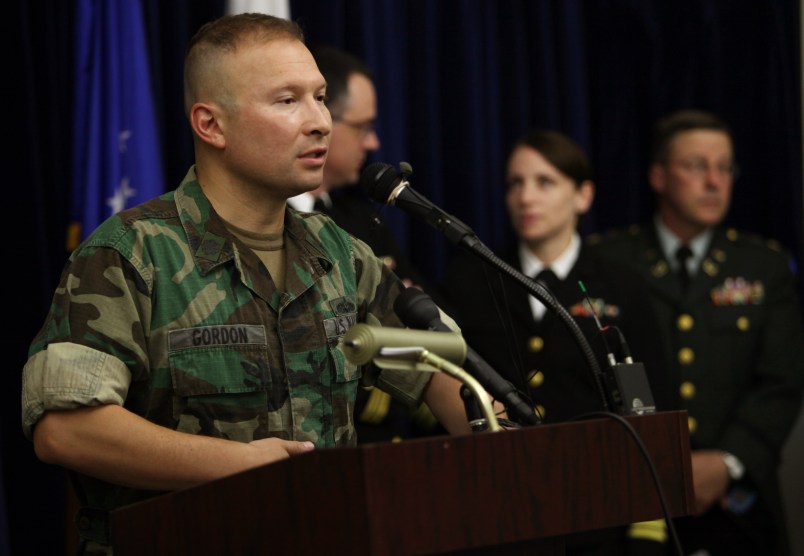LATE UPDATE Tuesday March 7, 2017 3:42 pm: In a phone interview, J.D. Gordon again disputed Diana Denman’s version of events, and said reports that he has changed his story about his degree of involvement in the Ukraine amendment she proposed were a “leap.” “I didn’t change the platform nor did I say I did,” Gordon said. Instead, Gordon recalled, he spoke privately with RNC national security subcommittee chairman Steve Yates during the meeting in which the amendment was discussed, and told him that language about providing Ukraine with “lethal defensive weapons” was a “problem” because it broke with Trump’s statements on wanting improved relations with Russia and not wanting to go World War III over Ukraine. He said Yates told him they would have a “robust discussion with delegates, and that was it.”
“[CNN’s] Jim Acosta took that to mean I pushed for the amendment,” Gordon said. “I mean, what’s the definition of pushed for the amendment, right? It’s an issue of semantics.”
Original story below:
In a significant reversal, a Trump campaign official on Thursday told CNN that he personally advocated for softening the language on Ukraine in the GOP platform at the Republican National Convention, and that he did so on behalf of the President.
CNN’s Jim Acosta reported on air that J.D. Gordon, the Trump campaign’s national security policy representative at the RNC, told him that he made the change to include language that he claimed “Donald Trump himself wanted and advocated for” at a March 2016 meeting at then-unfinished Trump International Hotel in Washington, D.C.
Gordon claimed that Trump said he did not “want to go to World War III over Ukraine” during that meeting, Acosta said.
Yet Gordon had told Business Insider in January that he “never left” the side table where he sat monitoring the national security subcommittee meeting, where a GOP delegate’s amendment calling for the provision of “lethal defense weapons” to the Ukrainian army was tabled. At the time, Gordon said “neither Mr. Trump nor [former campaign manager] Mr. [Paul] Manafort were involved in those sort of details, as they’ve made clear.”
Discussion of changes to the platform, which drew attention to the ties to a pro-Russia political party in Ukraine that fueled Manafort’s resignation as Trump’s campaign chairman, resurfaced Thursday in a USA Today story. The newspaper revealed that Gordon and Carter Page, another former Trump adviser, met with Russian Ambassador Sergey Kislyak at the GOP convention.
Trump and his team have long insisted that his campaign had no contact with Russian officials during the 2016 race, and that they were not behind softening the language on Ukraine in the Republican Party platform.
Attorney General Jeff Sessions on Thursday recused himself from all cases involving the Trump campaign, after the Washington Post revealed that he failed to disclose during his confirmation hearing that he had two meetings with the Russian ambassador during the campaign. Michael Flynn also stepped down as national security adviser in a cloud of controversy over reports that he spoke with Kislyak about sanctions against Russia during the post-election transition period.
Gordon acknowledged meeting with Kislyak to both CNN and USA Today on Thursday, and said that the conversation focused only on Trump’s oft-stated belief that “the U.S. and Russia should have a better relationship.”
He did not respond Friday to TPM’s request for comment, but denied to Business Insider that there was any significant distinction between how he characterized his involvement in altering the Ukraine amendment in January and in March.
“The RNC and Nominee’s Campaign have the authority and responsibility to shape the GOP Platform,” Gordon told Business Insider in an email, reiterating that Trump was not involved with the details.
“They weren’t part of the process to write, draft, edit the document, or weigh in with the delegates at all,” he wrote about Trump and Manafort. “That said, the overarching thought of better relations with Russia was certainly their strategic position.”
The watered-down language that ultimately ended up in the platform called for the U.S. to provide “appropriate assistance,” rather than lethal weapons, to Ukraine to push back against Russian intervention.
Watch the clip from CNN below:







Sounds like people are beginning to tweak their stories in advance of the indictments.
Not one thing they’ve said re: Russia have been true and they have had to course correct EVRYTHING.
Throwing Trump under the bus seems like a pretty significant tweak.
What is the real story of how Trump picked Tillerson? No way that Condi Rice and Bob Gates were the instigators when this web of people already existed.